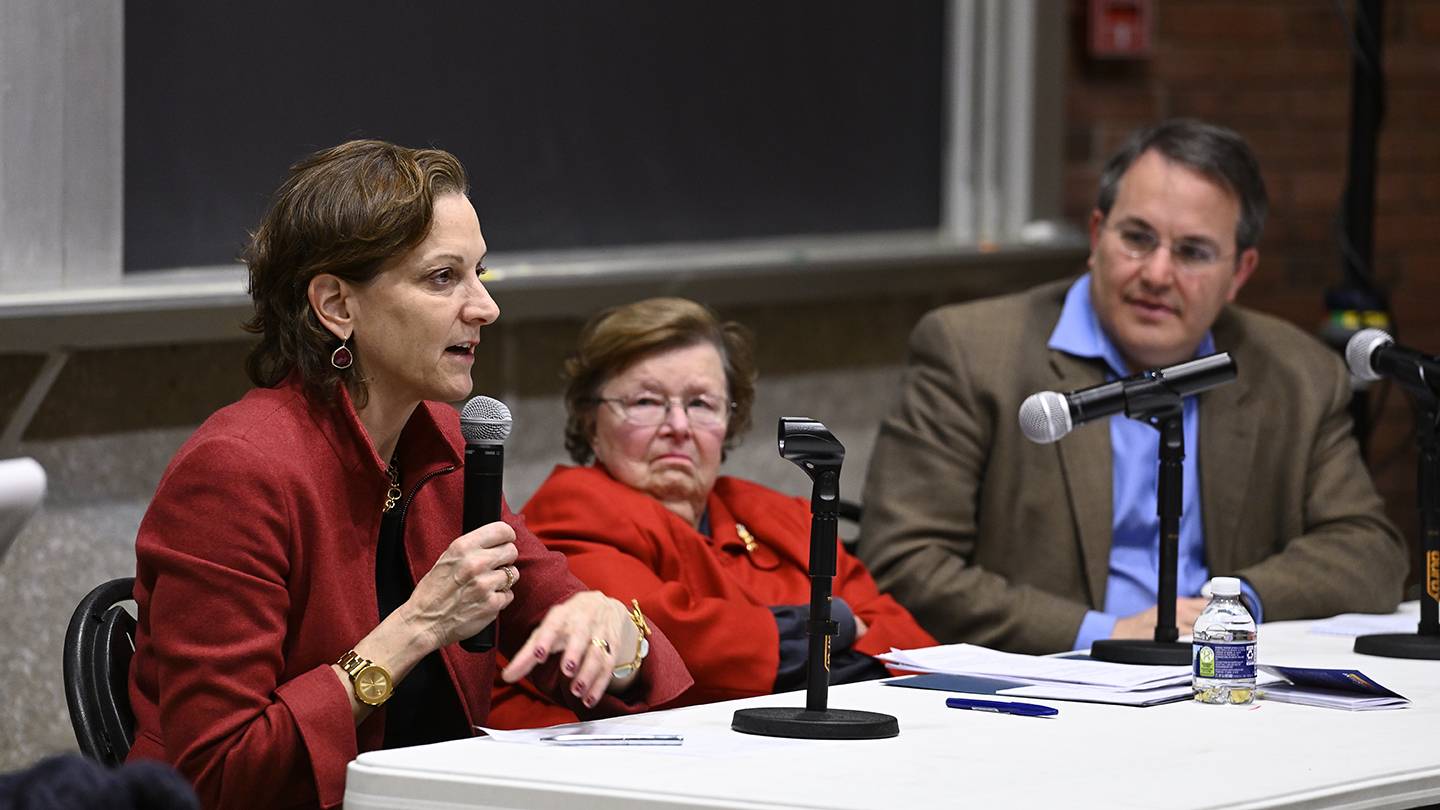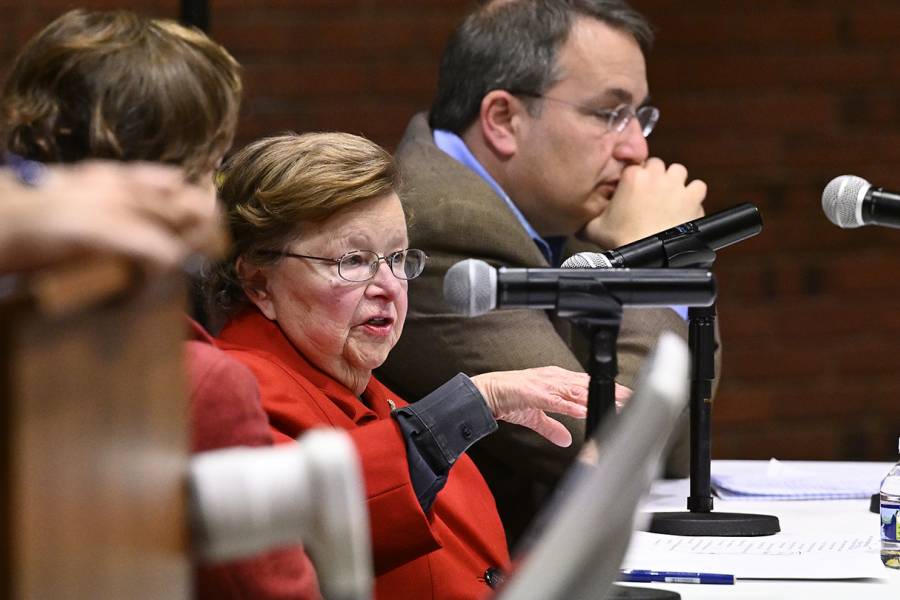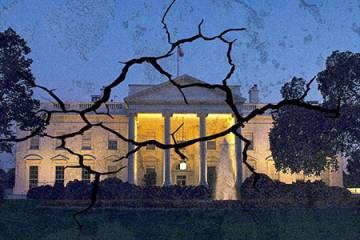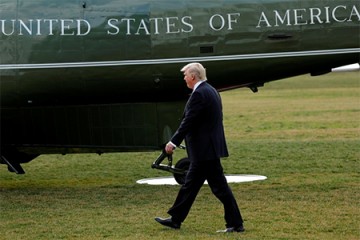The political favors President Donald Trump requested from Ukraine President Volodymyr Zelensky this summer were "exactly the kind of extortion that we've been trying to eliminate from Ukraine, and post-Soviet politics, for two decades," said scholar Anne Applebaum.
"It is exactly this kind of behavior that Ukrainians have held demonstration after demonstration about … in order to eliminate," she continued. "Trump is asking them to corrupt their politics in a manner that benefits him."
At a discussion Wednesday about the ongoing impeachment probe, Applebaum argued that the president's actions undermined 20 years of U.S. policy toward Ukraine, including efforts to promote rule of law and judicial independence and to end large-scale corruption.
The formal impeachment inquiry against Trump centers on requests he made for Zelensky to publicly support two corruption investigations—one focused on a conspiracy theory about Ukraine's involvement in the U.S. elections in 2016, and one that targets Hunter Biden, son of Trump's political rival and former Vice President Joe Biden.
On Wednesday, the public probe took a dramatic turn following the testimony of Gordon Sondland, U.S. ambassador to the European Union, whose statements connected Trump to an implicit quid pro quo that threatened to withhold $400 million in military aid to Ukraine and an official head-of-state visit if Zelensky didn't lend support to the investigations.
Sondland's testimony continued into the early evening, as Applebaum, a Pulitzer Prize–winning historian, joined longtime former Maryland Sen. Barbara Mikulski and political scientist Robert Lieberman to discuss the historical context of the impeachment inquiry.

Image caption: Panelists (from left) Anne Applebaum, Barbara Mikulski, and Rob Lieberman shared their thoughts on the historic nature of the Trump impeachment probe.
Image credit: Will Kirk / Johns Hopkins University
The conversation took place at Johns Hopkins University, where all three scholars have appointments: Applebaum is a senior fellow of the Stavros Niarchos Foundation Agora Institute, Mikulski is Homewood Professor of Public Policy, and Lieberman is a Krieger-Eisenhower Professor and former university provost.
Lieberman emphasized parallels between the Trump inquiry and the near-impeachment of President Richard Nixon, who resigned in 1974 before the House of Representatives could vote on articles of impeachment.
Both cases, Lieberman said, involve "the abuse of presidential power for personal political purposes, obstruction of justice … and essentially contempt of Congress, in the failure to produce evidence and witnesses that Congress is entitled to have."
And though extreme partisan division colored Nixon's inquiry—as it does with Trump's today—Lieberman noted a critical difference in the bipartisan accord found in the 1974 case. Enough Republicans supported Nixon's impeachment that proceedings in the House weren't cast as "some kind of partisan, Democratic railroad job against a president they didn't like," he said.
With Trump, who has characterized the inquiry as a witch hunt, Lieberman said he has "little confidence we're going to see a meeting of the minds soon" across partisan divides.
Mikulski shared her recollections of another impeachment proceeding, that of President Bill Clinton in 1999, which resulted in an acquittal after a Senate trial. Many have predicted that Trump's impeachment could meet the same fate in the current Republican-run Senate.
After watching the first days of the Trump hearings, Mikulski said she was moved by the integrity of the civil servants testifying. "They stepped up knowing that their own reputation would be smeared, their family could be under great stress, and [facing] endangerment to their own careers and future livelihood," she said, calling their honesty "a hallmark of democracy."
Applebaum, an expert on post-Communist Europe, helped frame Trump's impeachment inquiry in relation to Russia. She noted that Russian President Vladimir Putin and his supporters don't believe Ukraine should be an independent state, fueling the ongoing war and constant border skirmishes between the two countries.
Ukraine's centrality to the scandal, Applebaum said, is the direct result of Trump's attachment to "the Russian world and the world of Putin," with Trump reflecting "the Russian scorn for, and patronizing attitude toward, Ukraine." She said Trump's attraction to Putin is not surprising: "He represents the model of the kind of politics that Trump himself would like to be able to do."
As for whether the impeachment inquiry would hurt Trump's prospects of reelection in 2020, Lieberman expressed doubts.
"Nothing that President Trump does, or nothing that happens to him, seems to shake this base of support he has," he said.
Posted in Voices+Opinion, Politics+Society
Tagged politics, donald trump, elections, impeachment










